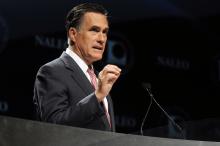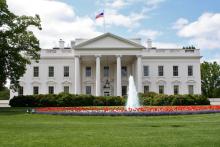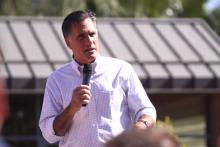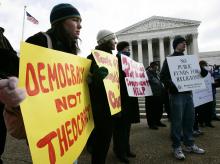2012 election
Zeenia Framroze, a student at Harvard University, spoke in April at Georgetown University Berkley Center's Millennial Values Symposium. She speaks in this clip on how the Millennial generation faces its challenges for the future in light of diverse value systems.
"If we stop listening to each other, if we try to impose our values on another group, we lose the noteworthiness of our values itself. We need to have some faith in democracy and some faith in the marketplace of ideas and values," Framroze said. "We'll bicker and fight, but ultimately we'll have a far more worthwhile discussion."
Politics is a true American idol, and the 2012 election will dramatically demonstrate that reality.
People of faith should never worship at the altar of politics, because we worship God; the kingdom of God is never the same as the kingdoms of politics. Our worship of God should shape our engagement with politics. When politics shapes our religion, it distorts our true worship.
Rather than becoming the chaplains or enablers of political idolatry, the faith community should confront it. The idols of politics are many: the idol of money over democracy, the idol of celebrity over leadership, the idol of individualism over community, the idol of ideology over civility, and the idol of winning over governing. Both sides take a problem and do two things: make us afraid of it, and then blame it on the other side. What they don’t do is work together to solve our problems, finding solutions for the common good.
What caused me to rethink these questions of faith and politics was my encounter earlier this year with a lion in a monastic community overlooking the Pacific Ocean at the beginning of my sabbatical. Entering into solitude and silence with monks, punctuated only by Vigils, Lauds, Eucharist, and Vespers, can alter a person’s perspective. In the monastery’s guest kitchen library, I spotted the Chronicles of Narnia, by C.S. Lewis, and decided to reread them. Aslan the lion is the creator and leader of Narnia, the true and good king, and the stories’ Christ figure. Because I was beginning to write a book about the common good, with Jesus as the inspiration for it, I was again drawn to Aslan.

Most Mormons in Utah believe that Mitt Romney’s rise to become the likely GOP presidential nominee is a good thing for the Church of Jesus Christ of Latter-day Saints. But many do not trust the media to cover the church fairly, according to a new poll released on June 25.
The study, conducted by Key Research and Brigham Young University’s Center for the Study of Elections and Democracy, is believed to be the first to gauge Mormons’ reaction to Romney’s barrier-breaking achievement. He is the first Mormon to clinch the presidential nomination of a major U.S. political party.
More than eight in 10 Utah Mormons said they are “very excited” or “somewhat excited” about Romney’s feat. Nearly as many (77 percent) said his nomination is a good thing for the LDS church; just 2 percent told pollsters it was a negative development.

Nearly one in five Americans say they would not vote for a Mormon president, a percentage that has hardly budged since 1967, according to a new Gallup poll.
It is unclear how the anti-Mormon bias will affect Mitt Romney, the presumed GOP presidential nominee, Gallup said, since just 57 percent of Americans know that he is a member of the Church of Jesus Christ of Latter-day Saints.
“This suggests the possibility that as Romney's faith becomes better known this summer and fall, it could become more of a negative factor,” Gallup writes, “given that those who resist the idea of a Mormon president will in theory become more likely to realize that Romney is a Mormon as the campaign unfolds.”

Church leaders today gathered in Washington, D.C., to announce the launch of the Evangelical Immigration Table – a broad coalition of organizations, churches and pastors from across the political and religious spectrum coming together to advance a cohesive immigration reform message.
The Immigration Table was launched at a press conference, with speakers including Sojourners CEO Jim Wallis, Dr. Richard Land, President of the Ethics and Religious Liberty Commission, Gabriel Salguero, President of the National Association of Latino Evangelicals and Tom Minnery of Focus on the Family, setting out a common set of principles reflecting the common ground that all members of the Table have found on the issue of immigration.
Read on to view photos from the press conference.

When Romney delivered his “Faith in America” speech in 2007, the Southern Baptist response was to label Mormonism a “theological cult” and “false religion.”
What's surprising in 2012 is the relative lack of anxiety on the other side, among evangelicals who for years considered Mormonism a "cult" that was to be feared, not embraced.
In fact, the relative ambivalence among prominent evangelicals about this new "Mormon moment" -- and the fact that Romney's campaign could mainstream Mormonism right into the Oval Office – could radically shift the dynamics on America's political and religious landscape.
Monday marked the 93rd anniversary of the congressional passage of the 19th Amendment to the Constitution on June 4, 1919.
After 71 years of movement forward and pushes back, the proposed Amendment to guarantee every woman in the United States the right to vote prevailed in the Senate. But it still had 36 more hurdles to jump before ratification; 36 of the then 48 states had to pass the Amendment in their state legislatures. On August 18, 1920 Tennessee became the 36th state to pass the Amendment and on that day women’s suffrage became the law of the land.
Florida missed that boat. The sunshine state had never voted on the 19th Amendment before it was ratified. A year later, the Florida state legislature passed its own law guaranteeing the vote to all citizens, but Florida’s legislature didn’t actually ratify the 19th Amendment until it took a symbolic vote in 1969.
As a woman I am grateful for the fact that in 1969 someone thought it might be a good idea to at least symbolically say, “Yeah, man, we’re cool with the ladies voting. We can groove with that.” But the current news about Florida’s voter purge has me wondering what happened in the 43 years between Florida’s symbolic thumbs up for suffrage and today’s current voter suppression?
The answer: The year 2000 happened.
It’s a good sign we’ve entered the election silly season when pundits are arguing against “fairness.” What’s next, apple pie? (Motherhood, of course, is already a battleground of the “mommy wars”—Lord help us!)
The Democrats are trying to take the pro-fairness side of the debate, in particular around the issue of tax rates for the wealthiest Americans. The so-called Buffett Rule—named after billionaire Warren Buffet, who pointed out the injustice of his paying a lower tax rate than his secretary—became a key talking point the week before April 15.
Here’s how President Obama put it: “Right now, the share of our national income flowing to the top 1 percent has climbed to levels we haven’t seen since the 1920s. And yet those same people are also paying taxes at one of the lowest rates in 50 years. That’s not fair.” (The Occupy movement arguably deserves most of the credit for that framing of the issue.)
The president’s political opponents were quick to dismiss the focus on tax fairness as campaign rhetoric aimed more at the fall elections than any meaningful policy goals. It’s a safe assumption that pretty much anything between now and November has that partisan goal in mind, and—perhaps not surprising—fairness polls well.
But the critics didn’t stop there. Conservative columnist Charles Krauthammer, for instance, called the Buffett Rule “nothing but a form of redistributionism,” and said that focus on the tax fairness issue “is an exercise in misdirection.” Minority Leader Mitch McConnell said that having the rich pay a higher tax rate “won’t take a single person off the unemployment line.” (It also won’t end the war in Afghanistan, he didn’t add.) Others brought out the tired accusation of “class warfare.”

Mitt Romney clinched the GOP presidential nomination on May 28, becoming the first Mormon selected by a major political party. But will his barrier-breaking faith be a boon or bane to his White House campaign?
The answer to that question could presage the next president, and two studies published in May come to contradictory conclusions.
In both studies people were given information about Romney and his Church of Jesus Christ of Latter-day Saints, then asked whether they would be more or less likely to vote for him.

With the 2012 election less than six months away, congregations are getting the message that Americans want religion out of politics. But that doesn’t mean they plan to keep mum in the public square.
Instead, they’re revamping how congregations mobilize voters by focusing on a broader set of issues than in the past. Preachers are largely avoiding the political fray, and hot-button social issues are relegated to simmer in low-profile church study groups.
Why? For one, Americans are growing impatient with religious politicking: 54 percent want houses of worship to keep out of politics (up from 52 percent in 2008 and 43 percent in 1996), according to the Pew Forum on Religion & Public Life. Churches seem to be responding.
If you have read books like Drew Westen’s The Political Brain, you might be forgiven for raising an eyebrow at this headline. A large body of work has emerged over the past few years that suggest that we vote with our hearts, rather than our heads. Policies, this body of work says, matter far less than our gut reaction to a candidate, their character and the party we naturally align ourselves with.
So to those who agree with this research, the results of a new report from the Barna Group might be surprising. Across the board, a candidates’ position on issues is overwhelmingly more important than their character, their party affiliation or their religious faith.

President Obama’s recent endorsement of same-sex marriage opened a torrent of speculation on what his newly enunciated position will mean politically, but the latest polls indicate the public largely backs his views and that his stance may not hurt him at the ballot box.
A Gallup poll in early May showed that by a 54-42 percent margin, American adults consider gay and lesbian relations “morally acceptable.” The level of approval has grown steadily since 2002, when it stood at 38 percent, so much so that Gallup considers the current situation “the new normal” in U.S. public opinion.
Another Gallup survey taken on May 10, a day after Obama announced his “evolution” in thinking on gay marriage, showed that 60 percent of Americans said it would make no difference in how they will vote in November, while 13 percent said it would make them more likely to vote for him and 26 percent said it would make them less likely to vote for him.
From yesterday's New York Times:
"There is nothing a presidential campaign likes less than to be forced to answer for someone else’s actions. And yet President Obama and Mitt Romney are likely to face that challenge repeatedly during this election season as their allies and adversaries in Congress pursue agendas that do not always make things easy on the campaign trail."
Read the full story here
Dan Gilgoff and other religion reporters examine why social issues will continue to shape the narrative of the 2012 election:
"Everyone knows the 2012 presidential race is about jobs and the economy. As likely Republican nominee Mitt Romney said a couple weeks ago: “It’s still about the economy, and we’re not stupid.” But have you noticed how the culture wars keep intruding into this it’s-all-about-the-economy election?"
Learn more here
Three decades ago, the evangelical faithful was galvanized by public debates over abortion, the size of the federal government, the future of the traditional family, and religious liberty. Many responded by following divisive leaders into the culture wars with the promise that voting for "moral" leadership would end abortion, protect traditional marriage and put our country on the right track.
How did that work? Not so well, it turns out.
In yesterday's New York Times, professor and author T.M. Luhrmann examined how Democrats can speak to evangelicals more effectively:
To be sure, they won’t connect to every evangelical. But the good news for secular liberals is that evangelicals are smarter and more varied than many liberals realize. I met doctors, scientists and professors at the churches where I studied. They cared about social justice. They cared about the poor. In the aftermath of Hurricane Katrina, many of them got into their cars and drove to New Orleans. This is a reachable population, and back in 2008, a quarter of white evangelicals voted for Mr. Obama. Democrats could speak to evangelicals more effectively if they talked about how we could develop our moral character together as we work to rebuild our country.
Glenn Kessler, writer of the Washington Post Factchecker column, issues a challenge to President Obama and Gov. Mitt Romney:
"With the presidential election looming in exactly six months, I would like to issue a challenge to you both: Give at least one campaign speech, on a substantive policy issue, lasting at least 15 minutes, that does not contain a single factual error or misstatement. That means no sugar-coating of your record, no exaggerated claims about your opponent’s record, and no assertions that are technically true but lack crucial context."
I’m not holding my breath for the challenge to be accepted.

Politics is a true American idol, and the 2012 presidential election will be a dramatic demonstration of that reality.
Simply put, we create an idol when we ascribe attributes or place hope in persons or things that should belong only to God. People of faith may be tempted to worship at the altar of politics, but make no mistake: The kingdom of God and the kingdoms of politics are never one and the same.
Our worship of God rightly should shape our engagement with politics, but when politics shapes our religion it distorts our service (and worship) of the One True God.

Today, Sojourners' Communications Director Tim King talks with CNN's Lisa Desjardins about politicians and God-talk in this 2012 presidential election season.
From CNN.com:
Is Washington a holy city? It might seem that way, with all the talk about religion and morality in the 2012 election.
But all that God talk may be rubbing voters the wrong way.
"It's getting ugly out there," said Tim King, an evangelical Christian who works for the progressive religious group Sojourners. "There are a lot of Christians who are using their faith as a political weapon, which it's never meant to be."
Listen to Tim's comments on CNN Radio inside the blog.

Back in John Kerry’s ill-fated 2004 presidential campaign, Democrats tried to attract so-called “NASCAR Dads” – white, working-class, mainly Southern fellows – to try to blunt George W. Bush’s re-election and show folks that Kerry was not a wealthy patrician who only appealed to “soccer moms.”
Now Ralph Reed’s Faith and Freedom Coalition is trying to corral what might be called “NASCAR Christians” in hopes that social conservatives will give Mitt Romney a crucial boost in November.